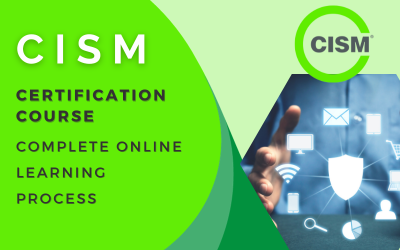
In today’s digital landscape, cybersecurity has become one of the most sought-after fields, with organizations across the globe seeking professionals who can protect their systems, data, and networks from ever-evolving cyber threats. As the demand for skilled cybersecurity experts grows, obtaining certifications that validate your expertise and leadership abilities is more critical than ever. Among the most prestigious certifications in the cybersecurity domain is the Certified Information Security Manager (CISM) certification, offered by ISACA. If you are aiming to advance your career in cybersecurity, the CISM certification could be the key to unlocking a wealth of opportunities.
What is the CISM Certification?
The CISM certification is a globally recognized credential designed for professionals who manage, design, and assess an organization’s information security program. Unlike purely technical certifications, CISM Training in New York NY focuses on the management and governance aspects of cybersecurity, aligning information security goals with broader business objectives. This makes it ideal for professionals who aspire to take on leadership roles in information security.
Earning the CISM certification demonstrates your expertise in four key domains:
-
Information Security Governance: Establishing and managing the information security program and ensuring it aligns with organizational goals.
-
Information Risk Management: Identifying and managing risks to the organization's information assets.
-
Information Security Program Development and Management: Designing, implementing, and managing security programs to protect sensitive information.
-
Information Security Incident Management: Planning and managing the response to security incidents to minimize impact and ensure business continuity.
Why Pursue the CISM Certification?
1. Career Advancement Opportunities
The CISM certification is tailored for mid-level and senior-level professionals, such as IT managers, security consultants, and CISOs (Chief Information Security Officers). Employers often prioritize candidates with CISM certification because it validates both technical knowledge and leadership capabilities, which are critical for strategic roles. According to industry surveys, CISM-certified professionals are among the highest-paid in cybersecurity, with salaries often exceeding six figures.
2. Global Recognition
CISM is recognized worldwide, making it a valuable credential for professionals seeking international opportunities. Whether you want to work for a multinational corporation, a government agency, or a global nonprofit, having a CISM certification ensures your skills are acknowledged and respected globally.
3. Focus on Business Alignment
Unlike many technical certifications, CISM bridges the gap between cybersecurity and business. It emphasizes aligning security practices with business objectives, which is essential for organizations aiming to achieve robust security while meeting strategic goals. This business-centric approach makes CISM holders valuable assets to their organizations.
4. Proven Leadership Skills
CISM certification not only tests your knowledge of cybersecurity but also assesses your ability to lead teams and manage complex security programs. If you aim to move into managerial or executive roles, the CISM credential equips you with the skills and credibility to do so.
Requirements for CISM Certification
To obtain the CISM certification, you need to:
-
Pass the CISM Exam: The exam consists of 150 multiple-choice questions covering the four domains. It is designed to assess your ability to apply knowledge in real-world scenarios.
-
Have Relevant Work Experience: You must have at least five years of work experience in information security management, with at least three years in at least three of the four CISM domains. However, certain education and certifications, such as a CISSP or a master’s degree in information security, can be used to waive up to two years of experience.
-
Agree to ISACA’s Code of Professional Ethics: This ensures you commit to ethical practices in your profession.
-
Maintain Your Certification: Once certified, you need to earn Continuing Professional Education (CPE) credits annually to stay up-to-date with the latest industry trends and maintain your credential.
Preparing for the CISM Exam
Passing the CISM exam requires thorough preparation. Here are some tips to help you succeed:
-
Understand the Exam Structure: Familiarize yourself with the exam domains and the weightage of each section. This helps you allocate study time effectively.
-
Use Official Study Materials: ISACA provides an official review manual and practice questions, which are invaluable resources for exam preparation.
-
Join Study Groups: Collaborating with other CISM candidates can help you gain insights, clarify doubts, and stay motivated.
-
Take Practice Exams: Regular practice tests help identify your strengths and weaknesses, allowing you to focus on areas that need improvement.
-
Enroll in Training Programs: Many organizations offer CISM exam prep courses, which provide structured learning and expert guidance.
Real-World Impact of CISM Certification
Earning the CISM certification not only enhances your knowledge but also has a tangible impact on your career and the organizations you serve. Certified professionals are equipped to:
-
Develop and implement security strategies that align with organizational goals.
-
Effectively communicate cybersecurity risks and solutions to stakeholders.
-
Lead teams to build and maintain robust security frameworks.
-
Respond swiftly and effectively to security incidents, minimizing downtime and financial losses.
Success Stories: Professionals Who Benefited from CISM
Take the example of Sarah, a cybersecurity consultant who struggled to break into management roles despite her technical expertise. After earning her CISM certification, she was promoted to Information Security Manager within a year. The certification not only enhanced her technical knowledge but also boosted her confidence in handling business-focused security challenges.
Similarly, John, an IT auditor, found that the CISM credential helped him transition into a cybersecurity governance role. The certification’s focus on risk management and governance made him a trusted advisor to the organization’s executive team.
Conclusion
In an era where cybersecurity is a top priority for businesses, obtaining the CISM certification is a strategic move for professionals seeking to advance their careers. It sets you apart as a leader who understands both the technical and business aspects of information security. With global recognition, lucrative career opportunities, and the ability to make a significant impact, the CISM certification is a valuable investment in your professional future.
If you’re ready to take your cybersecurity career to the next level, start your journey toward CISM certification today. With dedication, preparation, and the right mindset, you can achieve this prestigious credential and open doors to new opportunities in the ever-expanding field of cybersecurity.

0 Comments
Post Comment